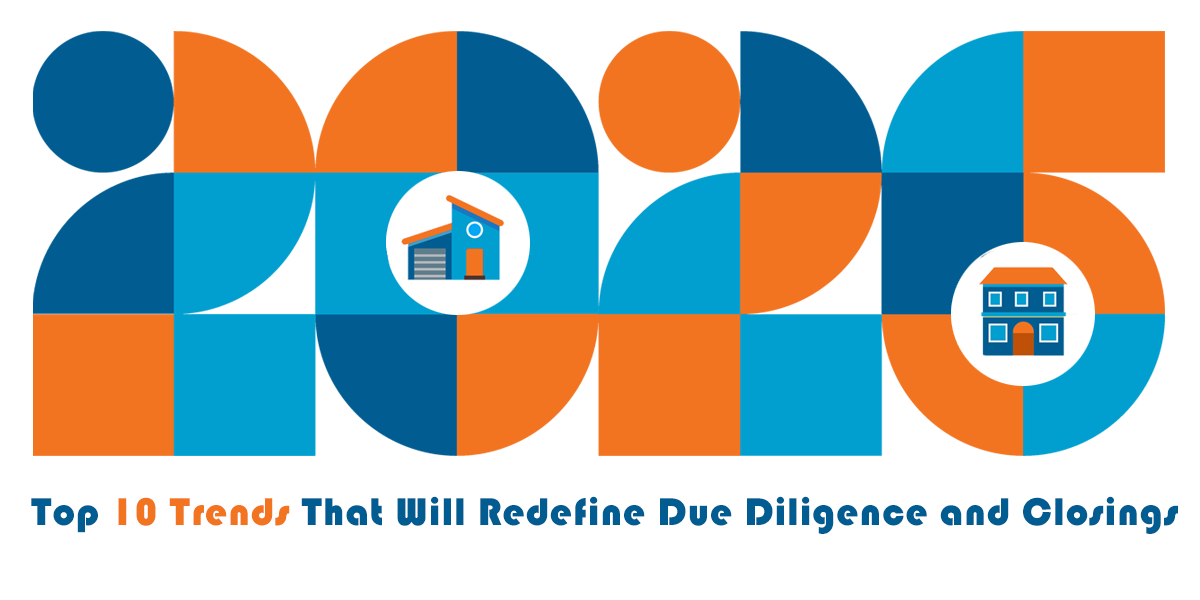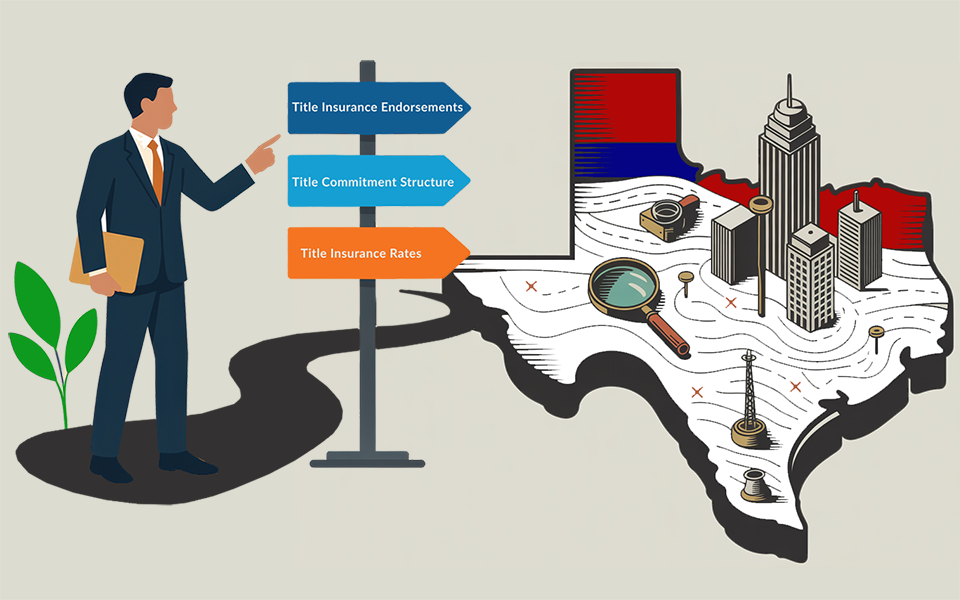FinCEN Compliance Reporting Services — Be Ready Before March 1, 2026 Learn More →
December 22, 2025
What’s Next for the Title Industry? Key Trends for 2025

Introduction
The title industry is at a pivotal moment, with 2025 shaping up to be a year of significant transformation. From groundbreaking technologies like blockchain and AI to the anticipated impact of a new administration in the White House, the coming year promises to bring both challenges and opportunities for title professionals.
Staying informed about these shifts isn’t just an advantage—it’s essential. Adapting to new trends ensures compliance with evolving regulations while meeting the increasing demands of clients in a rapidly changing market. This article dives into the key trends expected to define 2025, equipping industry professionals with the insights they need to thrive.
Whether you’re a title agent, real estate professional, or stakeholder, understanding what’s next for 2025 will position you to navigate the future with confidence and success.
1. Advanced Data Analytics and Predictive Modeling
As we step into 2025, data-driven decision-making is becoming indispensable in the title industry. With the rise of advanced data analytics and predictive modeling, title companies are leveraging cutting-edge technology to enhance accuracy, efficiency, and risk management.
Transforming Risk Assessment: Predictive modeling tools enable title companies to assess risks more effectively by analyzing historical data to identify trends and potential red flags. These models can pinpoint discrepancies in property records, predict potential market shifts, and flag signs of fraud, providing a proactive approach to risk mitigation.
Big Data for Smarter Decisions: Big data is no longer a buzzword—it’s a cornerstone for strategic decision-making. Title professionals are using massive datasets to gain insights into market trends, property value trajectories, and even client behavior. This allows companies to forecast demand and streamline operations based on data-driven predictions.
Efficiency Through Automation: By integrating machine learning algorithms into title search processes, companies can scan vast records within seconds, reducing manual errors and improving turnaround times. This technology not only enhances accuracy but also provides a competitive edge in an industry where speed and precision are critical.
Practical Applications for 2025: In 2025, expect more companies to adopt predictive tools that help them tailor services to specific customer needs. For instance, platforms that aggregate and analyze zoning data, lien histories, and title records will empower professionals to deliver more comprehensive insights to clients, solidifying trust and adding value.
The Competitive Edge: As the industry becomes increasingly data-centric, companies that invest in analytics will lead the way. The ability to anticipate market changes, identify risks early, and customize services will set apart those who embrace innovation from those who lag behind.
2. Technology Integration: Augmented Reality (AR) and Blockchain
Technology continues to redefine the title industry, and 2025 is set to be a landmark year for innovation. Two key technologies—augmented reality (AR) and blockchain—are driving significant advancements, reshaping how professionals interact with property data and secure transactions.
Augmented Reality: Enhancing Property Evaluation Augmented reality (AR) is revolutionizing property assessments and client engagement. By overlaying digital information onto physical spaces, AR tools allow users to visualize property boundaries, zoning details, and even historical changes. For title companies, AR can streamline property surveys, reduce fieldwork errors, and provide clients with an interactive experience that builds trust and transparency.
In 2025, we can expect AR to become more commonplace in property transactions, with applications ranging from virtual property tours to detailed visualization of easements or encroachments. This technology enhances accuracy and provides clients with a clearer understanding of property details before closing.
Blockchain - Securing Transactions with Transparency: Blockchain technology has already made waves in the financial and real estate sectors, and its influence on the title industry is growing. By creating immutable, decentralized records of transactions, blockchain offers unparalleled security and transparency for title processes. Title companies can store and verify property records, ownership histories, and liens on a blockchain, reducing the risk of fraud and ensuring data integrity.
In 2025, more title companies are expected to integrate blockchain into their operations. Smart contracts, enabled by blockchain, can automate aspects of the closing process, such as releasing funds once specific conditions are met. These innovations not only improve efficiency but also build confidence in the security of title transactions.
Combining AR and Blockchain: The combination of AR and blockchain has the potential to revolutionize property transactions further. Imagine a scenario where AR visualizations of a property are directly linked to blockchain records, allowing stakeholders to access verified data in real-time while interacting with a digital model of the property. This integration could drastically improve how title professionals communicate property details and verify data with clients.
The Road Ahead As these technologies become more accessible, title companies that embrace AR and blockchain will stand out. By providing enhanced services and secure transactions, they can meet the demands of a tech-savvy client base while staying ahead in a competitive market.
3. Regulatory Shifts Under the 2025 Administration
The new administration taking office in January 2025 is likely to bring significant changes to the regulatory landscape, with potential ripple effects on the title industry. Title professionals must prepare to navigate evolving policies, from housing initiatives to financial regulations, that could shape how business is conducted.
Federal Housing Policies and Affordable Housing Initiatives: A key area to watch is the administration's stance on housing. If the federal government prioritizes affordable housing programs, title companies may see an increase in activity tied to government-sponsored developments or housing subsidies. Programs encouraging homeownership could lead to a rise in first-time buyers, presenting opportunities—and challenges—for title companies managing high transaction volumes.
Stronger Consumer Protection Measures: The Consumer Financial Protection Bureau (CFPB) is expected to take a more active role in safeguarding homebuyers. This may include stricter regulations around disclosure requirements, ensuring buyers fully understand their title policies and related fees. Title companies will need to stay ahead by enhancing transparency and updating their practices to remain compliant.
Potential Tax Code Revisions: Changes in tax policies could impact property markets directly. For example, adjustments to capital gains taxes, mortgage interest deductions, or incentives for real estate investments may influence buyer and seller behavior. Title professionals will need to stay informed about these changes and their potential effects on transaction volume and market dynamics.
Increased Scrutiny on Data Privacy and Security: With cyberattacks on the rise, the administration may introduce stricter regulations around data protection. Title companies that handle sensitive client information will need to bolster their cybersecurity measures to avoid compliance issues. Additionally, enhanced reporting requirements could increase administrative workloads, prompting the adoption of more advanced data management solutions.
Proactive Adaptation to Regulatory Changes: Preparing for these shifts requires a proactive approach. Title companies should monitor policy announcements closely and seek legal guidance to understand how new regulations apply to their operations. Staying compliant will not only mitigate risks but also enhance trust with clients and industry partners.
Conclusion - Seizing Opportunities Amid Change: While regulatory changes may pose challenges, they also create opportunities for forward-thinking title companies. By aligning with new policies and maintaining a commitment to transparency and compliance, title professionals can navigate the evolving landscape of 2025 with confidence.
4. Cybersecurity as a Priority
As the title industry becomes increasingly digitized, the need for robust cybersecurity measures has never been more critical. With 2025 poised to usher in heightened cyber threats and stricter regulations, title companies must prioritize the protection of sensitive client and transaction data.
The Escalating Threat Landscape: Title companies are prime targets for cybercriminals due to the high value of the data they manage, including financial records, personal identification information, and property details. Common threats include phishing attacks, ransomware, and wire fraud schemes, all of which can disrupt operations and damage client trust.
The Role of Advanced Cybersecurity Tools: Investing in advanced security technologies is no longer optional. Encryption protocols, multi-factor authentication, and secure communication channels are becoming standard for protecting client data. Additionally, real-time monitoring tools and AI-driven threat detection systems can help companies identify and neutralize potential vulnerabilities before they are exploited.
Compliance with New Regulations: With the new administration expected to introduce stricter data privacy and security laws, title companies must be ready to meet these challenges. Regulations like updated consumer protection measures or expanded requirements under laws such as the Gramm-Leach-Bliley Act could lead to heavier penalties for data breaches. Companies that proactively align their practices with these requirements will avoid legal pitfalls and enhance client confidence.
Best Practices for Title Companies To stay ahead, title companies should implement a comprehensive cybersecurity strategy that includes:
• Regular employee training to prevent phishing attacks and social engineering tactics.
• Routine audits of IT systems to identify weaknesses.
• Adoption of secure platforms for online closings and communication.
Balancing Technology and Human Vigilance: While technology plays a critical role, human vigilance is equally important. Ensuring employees understand the latest threats and are equipped to handle them is key to a successful cybersecurity program.
The Competitive Edge In 2025, title companies with strong cybersecurity measures will stand out as trusted partners in real estate transactions. Protecting clients' data not only safeguards the business but also builds long-term customer loyalty in an era where trust is paramount.
5. Emphasis on Environmental Sustainability
As environmental and social governance (ESG) practices gain traction across industries, the title industry is no exception. In 2025, sustainability is expected to play a more significant role, driven by consumer demand, regulatory focus, and the new administration’s potential emphasis on eco-friendly policies.
Green Real Estate and Title Services: The real estate market is increasingly incorporating green building certifications, energy-efficient technologies, and sustainable property developments. Title companies are uniquely positioned to support these initiatives by streamlining processes for properties with eco-friendly certifications and assisting in transactions tied to renewable energy installations, such as solar panels.
Eco-Friendly Operations in Title Companies: Sustainability isn’t limited to property transactions. Title companies themselves can adopt greener practices by reducing paper usage, transitioning to digital closings, and optimizing energy use in their offices. These efforts not only reduce the industry’s environmental footprint but also appeal to eco-conscious clients.
Impact of Government Policies: The 2025 administration may or may not introduce or expand policies that incentivize green real estate, such as tax breaks for energy-efficient homes or grants for renewable energy projects. Title companies that align with these initiatives can enhance their value proposition and stand out as forward-thinking industry leaders.
ESG as a Business Imperative Environmental sustainability is becoming a competitive differentiator. Title companies that integrate ESG principles into their operations and services demonstrate social responsibility, which resonates with modern clients and investors. Moreover, regulatory shifts may soon make certain ESG practices a requirement rather than a choice.
The Long-Term Benefits: Embracing sustainability isn’t just good for the planet—it’s good for business. Companies that lead the way in green initiatives are more likely to attract clients, maintain regulatory compliance, and future-proof their operations against emerging environmental standards.
Conclusion In 2025, title companies have an opportunity to play a pivotal role in advancing sustainability within the real estate industry. By aligning with green initiatives and reducing their own environmental impact, they can meet consumer expectations, support the planet, and position themselves as industry innovators.
6. Customer-Centric Innovations
The real estate industry is increasingly driven by customer expectations for convenience, transparency, and efficiency. In 2025, title companies must embrace customer-centric innovations to meet these demands and build stronger relationships with their clients.
The Rise of Digital Closings: Digital closings are no longer a niche service—they are becoming the standard. Tools that enable remote notarizations, e-signatures, and virtual closing rooms are transforming how title companies interact with clients. These technologies save time, reduce paperwork, and offer flexibility, catering to a generation of clients who expect seamless digital experiences.
Mobile-First Strategies: As more consumers manage transactions on their smartphones, title companies are developing mobile-friendly platforms for document sharing, progress tracking, and customer support. Mobile apps that provide real-time updates on transaction statuses or instant access to important documents enhance convenience and foster trust.
AI-Driven Customer Support: Artificial intelligence (AI) is enhancing how title companies communicate with clients. Chatbots and virtual assistants can answer frequently asked questions, guide clients through complex processes, and provide 24/7 support. By automating routine interactions, title professionals can focus on more complex client needs, improving overall service quality.
Transparency and Trust Through Technology: Customers increasingly value transparency in their real estate transactions. Interactive dashboards, secure client portals, and real-time updates help clients stay informed and engaged throughout the title process. These tools not only enhance the client experience but also differentiate title companies in a competitive market.
Personalization at Scale: Leveraging data analytics, title companies can offer more personalized services. For example, tailored communication, customized closing timelines, and recommendations based on individual client needs can create a memorable customer experience, fostering loyalty and repeat business.
Building Long-Term Relationships: Customer-centric innovations go beyond technology—they involve a mindset shift toward prioritizing client satisfaction. By integrating digital tools with a human touch, title companies can deliver exceptional service that builds trust and strengthens long-term relationships.
7. The New Work Paradigm
The shift toward remote and hybrid work models has transformed the way businesses operate, and the title industry is no exception. As we move into 2025, the ability to adapt to new workplace dynamics will be critical for title companies striving to maintain efficiency and security.
Remote Work - The New Standard: Remote work, once a necessity, has now become a preference for many employees. Title companies are leveraging virtual tools to enable seamless collaboration among teams, regardless of location. Cloud-based platforms for document management and communication tools like video conferencing have made it possible to maintain productivity while offering employees greater flexibility.
Balancing Security with Accessibility: With remote work comes the challenge of ensuring data security. Title companies handle sensitive information, and protecting it in a distributed work environment requires robust cybersecurity measures. Virtual private networks (VPNs), multi-factor authentication, and secure cloud storage solutions are becoming essential for safeguarding data while enabling remote access.
Technology-Driven Collaboration: Advanced collaboration tools are transforming the way title professionals interact with clients and each other. Platforms that combine document sharing, task tracking, and real-time communication ensure that transactions move forward smoothly, even when team members are working remotely.
Hybrid Models for Client Interaction: While remote work is gaining popularity, many clients still prefer face-to-face interactions for critical moments in their transactions. Title companies are adopting hybrid models, blending in-person meetings with digital options, to accommodate diverse client preferences. This approach not only enhances client satisfaction but also builds trust.
Workplace Culture in a Remote Era: Adapting to the new work paradigm isn’t just about technology—it’s about fostering a strong workplace culture. Regular virtual check-ins, team-building activities, and training sessions can help maintain morale and ensure that remote employees feel connected to their teams.
The Competitive Edge: Companies that successfully adapt to remote and hybrid work models will position themselves as attractive employers while maintaining operational efficiency. By embracing this new paradigm, title companies can meet the needs of their workforce and clients in a rapidly evolving market.
Conclusion
The title industry is on the brink of a transformative era, with 2025 poised to bring advancements and challenges that will shape its future. From the integration of cutting-edge technologies like augmented reality and blockchain to adapting to new regulations under a fresh administration, the industry is evolving rapidly.
The trends discussed—advanced data analytics, sustainability initiatives, enhanced cybersecurity, customer-centric innovations, and remote work—offer opportunities for title companies to improve their services and stay competitive in an increasingly dynamic marketplace. However, these changes also demand adaptability and a proactive mindset.
To thrive in 2025, title professionals must embrace innovation while maintaining their core values of accuracy, transparency, and trust. By investing in the right technologies, staying informed about regulatory changes, and prioritizing customer and employee needs, the title industry can confidently navigate the future.
As the new year approaches, one thing is clear: the companies that are ready to adapt and lead will set the standard for success in the years ahead. The time to prepare for 2025 is now.
Related Posts
Florida HOA Estoppels in 2026: Timelines, Fees, and the Real Reasons Closings Get Held Up
You have a clean title search. The lender docs are in. The buyer is packed and ready to move. And then you get the call: the HOA estoppel hasn't ...
February 19, 2026
How to Read a Title Commitment: 12 Exceptions That Scare Buyers (But Don’t Always Kill the Deal)
If you have ever opened a title commitment and felt your stomach drop when you hit the exceptions, you are not alone. Buyers often see a long ....
January 31, 2026
Mortgage Payoff Letters: The #1 Last-Minute Closing Killer (and How to Prevent Delays)
Waiting on a mortgage payoff letter can derail closing. Learn payoff timelines, common delay causes, and a step-by-step payoff tracking checklist to keep files
January 25, 2026
2026 Title Industry Outlook: Top 10 Trends That Will Redefine Due Diligence and Closings
The title industry is heading into 2026 with more moving parts than at any time in recent memory: rapid regulatory change, deeper fraud risk ...
December 22, 2025
Beyond the Basics: Navigating Title Complexity in Texas Commercial Real Estate
Last spring, a Dallas investor was three days from closing on a mixed-use development site when the title examiner discovered something unusual ...
December 22, 2025
Witchy Titles & Cursed Closings: What Salem’s History Can Teach Us About Real Estate Due Diligence
In 1692, the town of Salem, Massachusetts descended into chaos. Fueled by fear, rumors, and suspicion, dozens of people were accused of witchcraft and ...
December 22, 2025
Title Under Siege: A First Look at Our New Guide to Deed Fraud and Seller Impersonation
Seller impersonation, in particular, is on the rise. In these cases, a scammer poses as the property owner—usually targeting vacant land, rental...
December 22, 2025
Real Estate Due Diligence Checklist: 9 Hidden Costs That Kill Closings
Imagine this: A $3.2 million Miami Beach home sale implodes because of a $127 unpaid utility lien that no one caught in time. Absurd as it sounds ...
December 22, 2025
Mastering UCC Searches: A Comprehensive Guide for Title Professionals and Lenders
In the world of commercial real estate and lending, due diligence is everything. Whether you're a title agent preparing for a closing in New York ...
December 22, 2025
Land Surveys vs. Title Searches: When You Need Both (and How to Budget)
Picture this: you’re days away from closing on a home when an unexpected hiccup surfaces. The seller’s old fence sits two feet inside the neighbor’s...
December 22, 2025
Top 10 Municipal Red Flags That Can Delay Your Closing (and How to Fix Them)
Real-estate contracts are filled with dates, deposits, and delivery deadlines. Yet even when buyers, sellers, and lenders stay on schedule ...
December 22, 2025
A Complete Guide to HOA Estoppel Letters: Everything Title Professionals Need to Know
Picture this: You're three days from closing, and suddenly you discover the HOA has outstanding fees that nobody knew about. The seller is scrambling ...
December 22, 2025
How Can Large Title Companies Thrive in Volatile Times?
When mortgage rates climbed to 23-year highs in late 2023, one national title insurer watched transaction volume plummet 45% over eight weeks yet ...
December 22, 2025
Summer Real Estate: Keep Closings Cool When the Market Heats Up
Summer signals one of the busiest times in real estate, especially in Florida, as well as in fast-growing markets like Texas, Arizona, and ...
December 22, 2025
Navigating Florida’s Title Regulations for Small Title Agencies
Running a small to mid-sized title agency in Florida can feel like juggling flaming torches—there’s licensing, escrow accounting, audits, data security ...
December 22, 2025
Top Mistakes When Ordering a UCC Search
UCC Searches are crucial in risk assessment and due diligence in commercial lending and secured transactions. Yet despite their importance, we have ...
December 22, 2025
The Role of Deed Preparations in Real Estate Transactions
In the high-stakes world of real estate, certain documents tend to get all the attention—purchase agreements, title insurance, and mortgage ...
December 22, 2025
The Title Pro's AI Companion: Using Skyline's SmartTitle Assistant
How much time did you spend drafting repetitive client emails today? Our average title professional saves 5+ hours weekly using SmartTitle Assistant™ ...
December 22, 2025
UCC Search vs. Title Search: What's the Difference — and Do You Need Both?
In the complex world of real estate transactions, due diligence is everything. Whether you're a lender evaluating a loan application, an investor ...
December 22, 2025
The Hidden Headaches of Association Estoppels in FL — And How to Avoid Them
Few documents cause as many unexpected delays and frustrations in the complex world of Florida real estate transactions as association estoppels ...
December 22, 2025
Navigating Market Volatility: What Title Professionals Need to Know Now — and What's Ahead in 2025
In today's real estate landscape, the only constant is change. Fluctuating interest rates, economic uncertainty, and shifting regulatory policies have ...
December 22, 2025
What Happens if a Satisfaction of Mortgage is Not Properly Recorded?
Paying off a mortgage is a significant financial milestone, but the process isn’t complete until the lender records the mortgage satisfaction with the ...
December 22, 2025
Generating New Business for Title Companies in a Competitive Market
The title industry is transforming. Increased competition, technological advancements, and shifting consumer expectations are challenging traditional ...
December 22, 2025
Spring Cleaning for Your Property Title: How to Refresh Your Real Estate Records
Millions of real estate transactions are delayed or fall apart each year due to title issues that could have been prevented. In fact, a recent study ...
December 22, 2025
Top Strategies to Prevent Quiet Title Issues
Quiet title disputes are a serious concern for real estate professionals, as they can disrupt transactions and create uncertainty around property ownership ...
December 22, 2025
Title Services for New Construction: What Builders and Developers Need to Know
The construction of a new home or commercial property is an exciting and ambitious project, but it comes with more than just design and building ...
December 22, 2025
Will AI Agents Replace Title Professionals? The Truth About Automation
Artificial intelligence (AI) has evolved beyond simple data analytics and chatbots. Today's AI "agents" can interact with web browsers, gather and analyze ...
December 22, 2025
10 Reasons Why Skipping a Land Survey Can Be Costly
A land survey might seem like an unnecessary expense, especially if the property has been owned for years without any issues. However, skipping this step ...
December 22, 2025
Title Industry 2.0: Harnessing AI, Data, and Cybersecurity for a Resilient Future
The title industry is at a crossroads. Traditional methods that have served us well for decades now face mounting challenges in an increasingly ...
December 22, 2025
How Title Services Impact Mortgage Underwriting Timelines
In the world of real estate, the journey from application to closing is filled with numerous moving parts. Among these, title services are a crucial yet ...
December 22, 2025
How Title Companies Can Meet Tight Deadlines Without Sacrificing Quality
In today's fast-paced real estate environment, speed is crucial. Title companies often find themselves in high-pressure situations where they must juggle ...
December 22, 2025
5 New Year's Resolutions for Title Companies in 2025
As 2025 kicks off, the title industry is moving faster than ever. With new technologies, shifting customer needs, and more complex regulations, there’s ...
December 22, 2025
How to Explain Title Insurance to Your Clients: A Real Estate Agent's Guide
Explaining title insurance isn't always straightforward, but with the right approach, it can become a valuable teaching moment for your clients. Picture this ..
December 22, 2025
The Hidden Complexities of Property Title Searches
You've found your dream home. The price is right, the location is perfect, and you're ready to sign on the dotted line. But before you do ...
December 22, 2025
5 Common Problems Found in Municipal Lien Searches and How to Resolve Them
Municipal lien searches are a crucial part of any real estate transaction. They uncover hidden financial and legal obligations tied to a property, ensuring ...
December 22, 2025
Commercial Property Title Due Diligence: Going Beyond the Basics
The landscape of commercial property title due diligence has transformed dramatically over the past three decades. Gone are the days when a basic title ...
December 22, 2025
Beyond the Standard Search: Advanced Commercial Title Due Diligence in Florida
Last month in South Florida, a seasoned commercial real estate investor nearly walked away from a $12 million mixed-use development purchase ...
December 22, 2025
Navigating the Cyber Minefield: A Title Professional's Complete Guide to Phishing Defense
The title industry is a prime target for cybercriminals, and phishing is one of the most common threats that title professionals face today. Imagine this ...
December 22, 2025
Elevating Your Title Company to New Heights - A Blueprint for Growth
Let's be honest – growing a title company isn't what it used to be. Gone are the days when simply maintaining the status quo was enough to ...
December 22, 2025
This Halloween Avoid Real Estate Nightmares: 5 Spooky Title Issues That Can Haunt You
Buying a new home is exciting, but not all surprises are welcome. Some title issues can be like ghostly figures lurking in the shadows ...
December 22, 2025
How to Overcome Common Title Operations Challenges and Boost Efficiency
Running a title company means you’re a key player in the real estate world, making sure property transactions go smoothly and securely. But, we get it ....
December 22, 2025
🎙️QuickCast: Future Trends in the Title Industry.
The title industry, like many others, is undergoing significant transformation due to technological advancements. While some of these changes ...
December 22, 2025
Zoning Letters and Everything You Need to Know About Them
A Zoning Verification Letter is an essential document that a property owner or developer may need to request from the local municipality....
December 22, 2025
Understanding Municipal Lien Searches: A Complete Guide
Imagine this scenario: You've discovered an incredible property, yet as the closing date approaches, an unsettling surprise reveals itself—a municipal lien...
December 22, 2025
Wire Fraud : Proven Defense Tactics for Title Professionals
Wire fraud is a rapidly growing threat in the real estate industry, with fraudsters becoming more sophisticated and aggressive in their ...
December 22, 2025
Preparing for August 17th: Essential Information on the NAR Broker Commission Changes
The real estate market is about to undergo significant changes as new commission regulations take effect on August 17. These changes ...
December 22, 2025
Maximize Efficiency in Your Title Business with AI
Integrating AI into title businesses can significantly enhance efficiency, accuracy, and customer service. By automating routine tasks, improving...
December 22, 2025
The Importance of Land Surveys in Property Transactions: What You Need to Know
Boundary surveys are essential in property transactions to accurately define property lines, identify encroachments, and resolve disputes. Conducted ...
December 22, 2025
Summer Selling Season: Essential Steps for Real Estate Pros to Ensure Smooth Transactions
Essential steps for real estate professionals to ensure smooth transactions during the bustling summer selling season include preparing properties, ...
December 22, 2025
A Step-by-Step Guide to Conducting a Thorough Municipal Lien Search
A thorough municipal lien search is crucial for uncovering any financial or legal claims against a property. This step-by-step guide ....
December 22, 2025
10 Interesting Facts About Colonial Land Ownership
Colonial America’s land ownership shaped the U.S. under British rule. Exploring these practices reveals the era’s struggles and innovations in property rights.
December 22, 2025
How Tax Certificate Searches Can Save You Time and Money in the Loan Closing Process
Tax certificate searches streamline loan closings, mitigate financial risks, ensure tax compliance, and save time and money for real estate professionals.
December 22, 2025
Recent Posts










.png)


















































